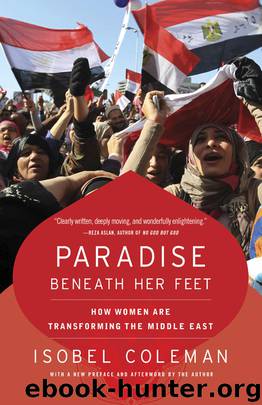0812978552 Paradise by Unknown

Author:Unknown
Format: epub
Published: 2016-07-28T16:00:00+00:00
Just Think!
The television program opened with the requisite South-Asian music jingle and the name of the show flashed across the screen—Zara Sochiye (“Just Think” in Urdu). The host, sitting in front of a cool blue background, introduced the day’s subject, Pakistan’s controversial Hudood Ordinance. In a smooth voice, he assured the viewer that the show would not take sides, but would bring people together to discuss the matter with knowledge and integrity. Around the table sat a group of Islamic scholars representing a range of perspectives, from moderate to more conservative. Some were wearing a suit and tie. Others wore a traditional outfit, a thick cotton shalwar kameez underneath a khaki vest with a matching Jinnah cap, the fez-shaped hat made from fake karakul wool and named after Pakistan’s founder.
The host of the show introduced the question of the day: “The Hudood laws are presented as divine laws, which cannot be touched. Do you agree?” Politely, the experts made nuanced theological arguments, but quickly a consensus emerged. The Hudood laws not only are man-made, but they are open to changes and improvements. While this might not sound like riveting television, Zara Sochiye became a media sensation in Pakistan in the spring of 2006 through its open discussions of the Hudood Ordinance.
The show was the brainchild of Mir Ibrahim Rahman, grandson of the founder of the Jang Group, one of South Asia’s largest media conglomerates. At the end of 2001, Mir left his investment banking job with Goldman Sachs in New York to return to Pakistan to launch GEO TV, an independent satellite channel that his father had badgered the government for years to establish. At the time, Mir was twenty-eight years old. Overnight, he became one of the youngest CEOs in the television business.
On his flight home to Karachi, Mir wrote a memo to himself outlining what he hoped to accomplish by taking up the challenge of GEO TV. One of his goals was to stimulate critical thinking in his home country on a range of sensitive issues. High on his list was the Hudood Ordinance.
In Karachi, GEO hired more than two hundred journalists and producers, explicitly seeking out a diverse mix of talent—men and women, all ethnicities, class backgrounds, and political persuasions. “We were looking for real balance,” explained GEO’s president, the veteran Pakistani editor and journalist Imran Aslam.22 The company was determined to project a nonelitist image and a range of views. GEO TV launched in August 2002, offering a mix of news, business, sports, and entertainment. Stealing viewers from the staid state-run television, its ratings quickly climbed. It soon captured a third of the market.
GEO’s innovative shows, each pushing cultural and political boundaries in its own way, became hugely popular. One show offers political satire, skewering public figures in often hilarious and certainly unprecedented fashion. Another program, Aalim Online (“Scholar” Online) showcases mullahs debating the meaning and social implications of various Quranic passages. GEO has stirred controversy by addressing such sensitive issues as incest, birth control, and homosexuality.
Download
This site does not store any files on its server. We only index and link to content provided by other sites. Please contact the content providers to delete copyright contents if any and email us, we'll remove relevant links or contents immediately.
| Africa | Americas |
| Arctic & Antarctica | Asia |
| Australia & Oceania | Europe |
| Middle East | Russia |
| United States | World |
| Ancient Civilizations | Military |
| Historical Study & Educational Resources |
Red Famine: Stalin's War on Ukraine by Anne Applebaum(2917)
Midnight in Chernobyl by Adam Higginbotham(2537)
Chernobyl by Serhii Plokhy(2534)
Midnight in Chernobyl: The Untold Story of the World's Greatest Nuclear Disaster by Adam Higginbotham(2217)
Red Shambhala by Andrei Znamenski(2190)
The House of Government by Slezkine Yuri(2190)
The Gulag Archipelago (Vintage Classics) by Aleksandr Solzhenitsyn(2091)
Red Notice by Bill Browder(2068)
All the Kremlin's Men by Mikhail Zygar(2062)
From Cold War to Hot Peace by Michael McFaul(2027)
Putin's Labyrinth(2014)
From Russia with Lunch by David Smiedt(1968)
The Future Is History by Masha Gessen(1903)
A People's Tragedy by Orlando Figes(1862)
The Romanovs by Simon Sebag Montefiore(1819)
How to Tame a Fox (and Build a Dog): Visionary Scientists and a Siberian Tale of Jump-Started Evolution by Lee Alan Dugatkin & Lyudmila Trut(1759)
The Lost Spy by Andrew Meier(1744)
Putin's Labyrinth: Spies, Murder, and the Dark Heart of the New Russia(1739)
Art and Revolution by John Berger(1716)
